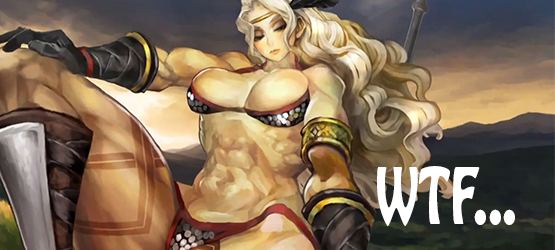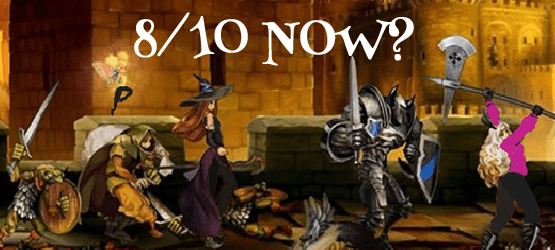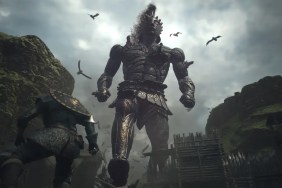Responding to a controversial review has become one of the internet’s favorite pastimes, and nothing as of late gets people more riled up than the topic of sexism. Today, Polygon released a review for the hyper-sexualized brawler hybrid Dragon’s Crown and it already has sparked up a number of questions. With that, the Daily Reaction crew of Seb and Dan try to break down the cause for the controversy and figure out what is going on.
Dan: Game reviews, for the most part, are considered to be the opinion of a single journalist, so debating the merits of someone’s thoughts does seem futile in general. But, the issues surrounding Polygon’s review of Dragon’s Crown opened up a door to ask just how much our own beliefs are supposed to weigh in on a score when breaking down the quality of a game.
Danielle Riendeau, the author of the Dragon’s Crown review for Polygon, breaks down the game with a generally mixed review that says:
…it shines in building a world of fantastic monsters and environments, and the forced grind through the same stages dulled my excitement. Dragon’s Crown is a wild place to visit, but it doesn’t quite hold up in the light of day.
Ultimately, the review gave Dragon’s Crown a 6.5 out of 10, compared to the Metacritic average score of 83 (or 8.3 on a 10 pt scale). The discrepancy between the two scores seems to pivot on a personal value that Riendeau places on the games more controversial art.
Dragon’s Crown makes a strong first impression. It’s a fun mix of RPG tropes and dynamic brawler action. But I found its over-exaggerated art style alienating and gross in its depiction of women…
This statement that headlines the original quote is the basis that seemingly drops the whole review away from being about the quality of the product and makes it about a personal value system. Given that Dragon’s Crown’s character designs of abnormally large chested female characters with disfigured bodies have been heating up across the internet since screenshots were first released, it almost seems like Polygon decided to give the review to the one writer on staff that would be most likely to have the biggest problem with the game.
While this is not a personal attack on Riendeau or her previous work at the ACLU or pro-feminist publications, as she has probably done more to help people than I have, it just begs the question of why give someone with that background the review for a game like this?
Looking at the way the whole review was handled, it is almost as if Polygon was looking to create controversy instead of just reporting on something already within the industry. We don’t know if Polygon gave her the review simply because of her background or if it was just a chance occurrence. But, the scoring of a game should, in my opinion, not stem from a personal stance against values you are not the target demographic for. Especially when that scoring system impacts a much bigger scoring aggregate like Metacritic, which strips away personal views for a qualifying score.
As personal values and biases will always be a part of review scores, it is the job of a publication and journalist to try and mitigate the gap between their personal beliefs and the general public. With that, if attention does need to be raised regarding a specific situation, it would stand to make more sense to do that within an editorial that can fully breakdown the issue, as opposed to glossing over it during a review.
As I do understand the objections posed, and do agree with the concerns raised about the portrayal of women, it just seems like an odd format to use as your soapbox. Looking at the visuals of DC, it looks wonderfully colorful and incredibly well realized, even if the content is slightly off putting. This I think is the core to the problem that starts when a reviewer focuses on a single aspect and uses it as a driving force to bury a product. In this case, the visuals, while normally being a subject that most people do not want to be a determining factor, has become the catalyst for DC’s critical demise. Something that normally would have been nothing more than a bullet point on a list of issues with the product has become the nail it is going to be hung by.

Seb: This is a tricky subject, and not one I agree fully with Dan on. Reviews are personal opinions, and, while different publications have different views on how much impartiality should exist in a review, no site has truly unbiased content.
Every writer goes into a review with some half-formed notions of the game, may have a different take on story elements based on their own lifestyle, and already has preferences to one genre or another. Take The Last of Us – before reviews began, we all thought it would be great, but some people were more drawn to other genres. Equally, the father-daughter relationship impacted our reviewer Anthony Severino – who has a daughter of its own – far more than it impacted me (no kids).
But any good reviewer will mention their own biases, incorporating them into the review and explaining why their view makes them feel such and such, in a way where people who don’t share the view can still work out whether the game is for them. That way, writers can air their personal grievances or adoration of a particular facet of a game, but in such a way that people who aren’t the same are still able to appreciate the review.
The true problem here is the score – it’s a definitive statement about the quality of a product. Reviewers will often tell people to “read the review” to understand the score (hell, I’ve probably done it), and say that the body of the text is more important than the score. Unfortunately, that’s not the world we live in, and reviewers know that. Scores are what stick, they’re what matter over time and, like Dan mentioned, they’re what are used on Metacritic. Polygon (like PSLS, I’ll admit) is a Metacritic site, so their score, taken without any personal context, goes on to impact the game’s grade on the aggregate site – a site where the score affects bonuses, sales, CVs and more. So when a uniquely personal view, which the author is aware is a uniquely personal view, is consciously used to help score something, there is a real cause for concern.
That said, because reviews have such an impact on those in an industry, they are an effective way to try to bring about change. If Dragon’s Crown had been universally critically panned for its portrayal of women, it would probably have led to the developer making changes in their next title. This is a sort of activism, where the writer uses the review to make a bigger statement about the industry as a whole – in this case, the sexualization of women is wrong. I can see the merits of this, but I again believe further context should be given that discusses the art style and the cultural differences between Japanese-inspired titles and western ones.
Honestly, I’m torn. Personally, I can’t say I’m a fan of the style of what I’ve seen of Dragon’s Crown (I have yet to play it), with the character’s looking downright ludicrous, unsexy and embarrassing. But, at the same time, just because I’m not into it, doesn’t mean it should be disapproved. There are people that like this, and there are people who find the models attractive. Games don’t have to appeal to everyone, it’s a title solely aimed at a certain type of male gamer, and that’s perfectly fine. The aim shouldn’t be to stop games that only appeal to those males, but rather to also have developers create games that appeal to a wide variety of gamers. Just like in the movie industry, where there is a rich tapestry of content that includes films where the women are sexualized, films where the men are sexualized, or films where the guns are sexualized. I don’t like every movie, but I wouldn’t crusade against one that isn’t aimed at me.
There needs to be a distinction made between content designed to change an industry, and content created to tell someone whether they should buy a game or not.
But whatever side of the fence you fall on, there’s one thing everyone should agree upon – the reaction to this review has been abysmal. Trolls and genuine misogynists have come out of the woodwork to criticize the writer for being a woman, or used flawed arguments about the men in the game also being over-stylized (they’re exaggerated in a male-focused power way, rather than sexualized). This is just counterintuitive, and makes the problem all the worse.
There are people out there, normal, balanced gamers, who will love Dragon’s Crown, but they are currently being represented by a bunch of people who are making DC fans look like pathetic sexists with no understanding of the female form. It only serves to reinforce the viewpoint of those in favor of doing away with the art style, and damages any chance at a true discussion.
That’s why you’re not seeing editorials like this elsewhere – there’s too much concern that voicing any disagreement over the review will end up with the writer(s) being lumped in with all the idiots on messageboards across the web.
This is a truly fascinating and important topic – how ‘political’ should reviews be? But right now the topic has degenerated into conversations about whether women should play games or the like. If you’ve made it all the way down to here, you clearly aren’t the sort of person to quickly jump to conclusions, so I urge you to discuss the matter online, even if you disagree with us, as the industry can do better than what’s online right now.
What do you think of Dragon’s Crown‘s character designs? Should Polygon have scored the game based off of a personal view? Or should reviews keep away from trying push personal prerogatives? Let us know in the comments below, email us at DailyReaction@PlayStationLifeStyle.net or tweet us your thoughts at Seb and Dan.








